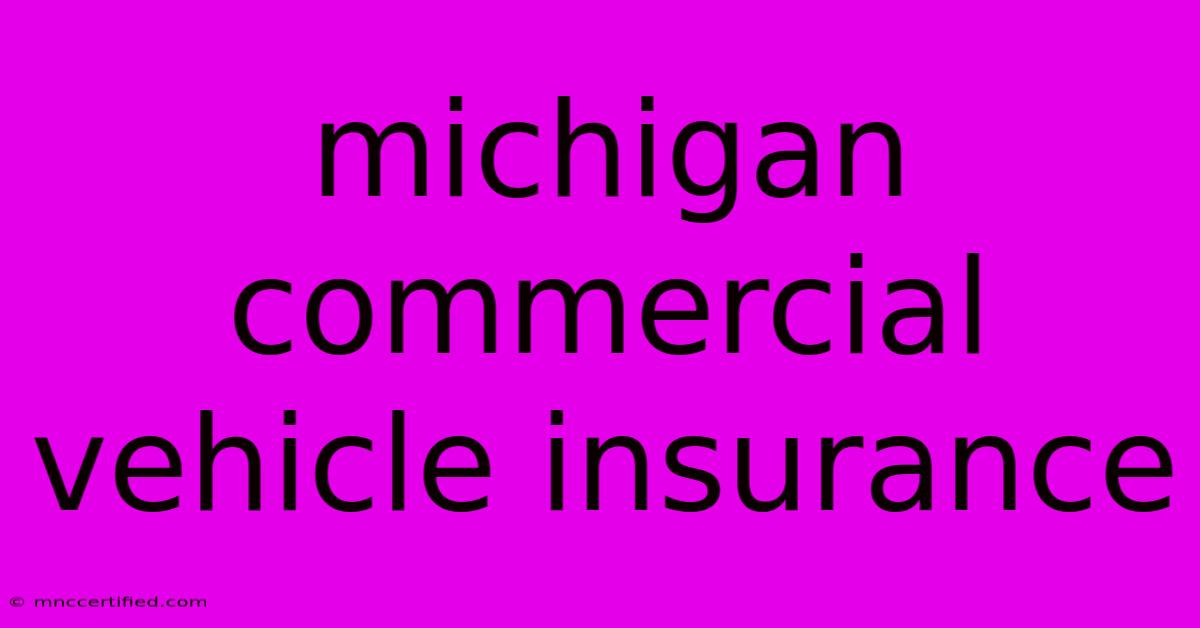Michigan Commercial Vehicle Insurance

Table of Contents
Navigating the Roads of Michigan: A Guide to Commercial Vehicle Insurance
Running a business in Michigan that involves vehicles, whether it's a fleet of delivery trucks or a single construction vehicle, requires more than just a valid driver's license. Commercial vehicle insurance is essential for protecting your business from the financial risks associated with accidents, property damage, and legal liabilities.
This comprehensive guide will help you understand the nuances of Michigan commercial vehicle insurance, ensuring you have the right coverage to keep your business moving forward.
Understanding the Different Types of Coverage
Michigan commercial vehicle insurance covers a wide range of risks, and it's crucial to choose the right policies for your specific needs. Here's a breakdown of common coverage types:
- Liability Coverage: This is the most fundamental type of commercial vehicle insurance, protecting you financially if your vehicle is involved in an accident that causes injury or property damage to others.
- Collision Coverage: This covers the costs of repairing or replacing your vehicle if it's damaged in an accident, regardless of who's at fault.
- Comprehensive Coverage: This protects your vehicle against damages from non-collision events like theft, vandalism, and natural disasters.
- Uninsured/Underinsured Motorist Coverage: This provides financial protection if you're involved in an accident with a driver who lacks sufficient insurance or is uninsured.
- Cargo Coverage: This insures the goods you transport, protecting you against loss or damage during transit.
- Medical Payments Coverage: This covers medical expenses for you and your passengers, regardless of fault, if you're involved in an accident.
- Roadside Assistance: This covers the cost of services like towing, flat tire changes, and jump starts in case of breakdowns.
Factors Influencing Your Premium
Several factors can affect the cost of your Michigan commercial vehicle insurance premiums. These include:
- Type of Vehicle: The size, weight, and type of vehicle all play a role in premium calculations.
- Usage: The purpose of your vehicle, whether for transportation, delivery, or construction, can influence your premium.
- Driver History: Your drivers' driving records, including any accidents or violations, can affect your insurance rates.
- Business Size and Location: The size of your fleet and the location of your business can also impact your premium.
- Coverage Limits: The amount of coverage you choose will directly influence the cost of your insurance.
Finding the Right Insurance Provider
With various insurance providers offering different packages and coverage options, finding the right fit for your business can feel daunting. Consider these factors when selecting a provider:
- Reputation and Financial Stability: Choose a reputable insurer with a history of financial stability and excellent customer service.
- Coverage Options: Ensure the provider offers the specific coverages you need for your business, such as cargo insurance or roadside assistance.
- Pricing and Discounts: Compare quotes from multiple providers to find the most competitive rates and potential discounts.
- Customer Service: Choose a provider known for its responsiveness and helpfulness.
Tips for Maintaining Coverage and Reducing Costs
- Maintain a Clean Driving Record: Encouraging safe driving practices among your drivers can help avoid accidents and keep your premiums low.
- Improve Vehicle Safety: Implementing safety features like backup cameras and blind-spot monitoring can reduce accidents and potentially lead to discounts.
- Explore Discounts: Inquire about potential discounts offered by your insurance provider, such as safe driver discounts, multi-policy discounts, or discounts for safety features.
- Shop Around Regularly: Don't be afraid to compare quotes from different insurers periodically, as rates can change.
Legal Requirements for Commercial Vehicle Insurance in Michigan
The state of Michigan has specific requirements for commercial vehicle insurance. Make sure you understand these regulations to avoid penalties:
- Proof of Insurance: You must carry proof of insurance whenever operating a commercial vehicle in Michigan.
- Minimum Coverage Requirements: The minimum liability coverage required varies depending on the type of vehicle and the number of passengers it can carry.
- Financial Responsibility Laws: Michigan has strict financial responsibility laws that hold commercial vehicle operators accountable for any damages they cause.
In Conclusion
Michigan commercial vehicle insurance is a necessity for businesses operating vehicles in the state. By understanding the different coverage types, factors affecting premiums, and legal requirements, you can make informed decisions to protect your business and your employees. Remember, always seek advice from a licensed insurance agent to ensure you have the right coverage and peace of mind on the road.

Thank you for visiting our website wich cover about Michigan Commercial Vehicle Insurance. We hope the information provided has been useful to you. Feel free to contact us if you have any questions or need further assistance. See you next time and dont miss to bookmark.
Featured Posts
-
Is Encompass A Good Insurance Company
Nov 10, 2024
-
Alabama Vs Lsu Tv Channel And Time
Nov 10, 2024
-
Does Insurance Cover Holistic Doctors
Nov 10, 2024
-
How Long Does Bonding On A Tooth Last
Nov 10, 2024
-
Greenwich Bay Trading Company Raleigh
Nov 10, 2024